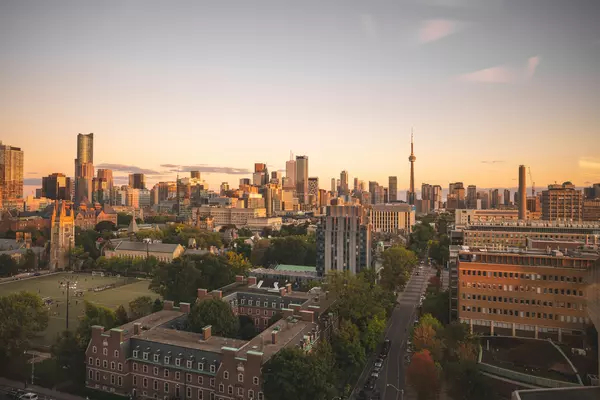After a distinguished 30-year career in the public service, Helen Angus is ready for her newest role: distinguished fellow at the Munk School of Global Affairs & Public Policy.
Angus’ “varied and interesting career” has included provincial posts at the Treasury Board Secretariat, International Trade, Citizenship and Immigration as well as work in pan-Canadian organizations. The majority of her career has been spent in the health sector, most recently as Deputy Minister of Health from June 2018 to September 2021, where she helmed Ontario’s initial health response to the COVID-19 pandemic.
Angus spoke about her experience as a leader in the public sector and what she hopes to bring to her role at the Munk School.

How did you come to be a fellow at the Munk School? What drew you to this opportunity?
I was looking for something after my career in the public service where I could contribute to the next generation of leaders, do some lecturing, and be in an academic environment. I also wanted something that was broadening. I had just been in deep COVID mode, chairing the Command Table at the Ministry of Health and overseeing the health response to the pandemic. I had spent almost four years as the Deputy Minister of Health and I thought the Munk School would give me an opportunity for reflection and exposure to ideas and research in areas that I was really interested in.
How has your experience been so far?
It has been terrific — it is giving me the experience that I was looking for. I participated in a case competition on an immigration issue in late 2021. I was really impressed by the students and how they fought through the problem and thought a lot about what a minister would need to understand to take action in a very complex situation. I've just taken part in another competition in March.
I also have a mentee now in the graduate program. We meet monthly and she's just fantastic. It's been a great opportunity for me to understand the student experience a little better as well.
How has the health sector evolved over your career, and where do you think it should be going?
I think about my early jobs in health planning. At that time, the health budget was growing at 11% a year. Now it's closer to three or four percent. Years ago there would be calls for new and expanded health programs to what were then district health councils. As I look back on that experience, I think it was much less data-driven than how decisions are made today.
Today, the healthcare system is very sophisticated. Our understanding of quality and capacity are much more numerate. We also have a much better understanding of patient needs. We have much stronger patient voices and structured and valued patient engagement processes across the sector.
I do worry about the post-pandemic era and the impact Covid has had on the people who work in the health sector. They have worked tirelessly to provide care to people, many in very difficult circumstances. People have put their lives on hold to provide care. We are seeing more and more burnout amongst health providers and our understanding of the full health impacts of the pandemic are just being understood. For example, I expect that it will take years to catch up on the health procedures that were delayed because of the pressing needs of COVID patients. I hope some of the things that we put into place during COVID, like virtual care, will become regular features of the healthcare system and that we don't go back.
What do you think this means for Munk School students who are about to enter the workforce?
There is a great need for talent and imagination in public institutions, whether that's in provincial federal, provincial or municipal governments, our hospitals, community-based organizations or other areas of the broader public sector. As a deputy I was always looking for people who had great analytical skills, [who] could problem-solve as well as implement.
I think that there's going to be a lot of opportunity. I'm encouraged by the economic growth numbers that we've seen come out from the Ministry of Finance in the third quarter. I think the recovery is going to require a lot of heavy lifting, particularly in the health sector. There are some great programs at the government of Ontario that are designed to recruit recent grads: I was one of those students back in the day. They really select some of the best, which would include students from the Munk School and prepare them for a progressive career in public service.
Could you talk a little bit about your healthcare accomplishments, pre-COVID?
I am most proud of the work I led working with stakeholders and bringing structure to the common desire to collaborate to better serve patients. I always learned a lot from talking to stakeholders because they shared their challenges in providing the best care for patients. Our discussions helped answer the big questions in health care. Did we have the policy right? Were we putting our money in the right places? Were we incentivizing the positive change? Hearing from stakeholders firsthand is what informed new models of care like Ontario Health Teams, which I’m happy to say ended up being enormously helpful to the COVID response.
Could you talk about the experience of being the Deputy Minister of Health at the beginning of the COVID-19 pandemic?
It was probably the most intense work experience I've ever had in my career. It's easy to look back on it now, but at the time we didn't know much about COVID as a disease, or about how it spread.
The good news is that the Ministry of Health had done a lot of planning and had an emergency response structure that was well articulated and ready to go. People generally knew their roles and responsibilities. The scope and scale of COVID quickly required an all-government response and many of the other ministries were also engaged. It was great working with my colleagues across the government as we tried to lessen the impact of the pandemic.
Probably the biggest leadership challenge of my career was to marshal the health response, bring the right people to the table, set the right cadence of meetings, and support the government to make decisions much more quickly and with more uncertainty than usual. There were times when the cabinet was meeting every day. I probably didn't have a day off for 20 months between January 2020 and September 2021. The response in government as in the health sector took over your life. It was intense. Yet, there's something about going into battle with your colleagues. It forms relationships. That certainly was, I think, what kept me going.
The good news is that the Ministry of Health had done a lot of planning and had an emergency response structure that was well articulated and ready to go. People generally knew their roles and responsibilities. The scope and scale of COVID quickly required an all-government response and many of the other ministries were also engaged. It was great working with my colleagues across the government as we tried to lessen the impact of the pandemic.
You mentioned how it was your biggest challenge as a leader. How did you manage and overcome the huge challenges that came with it?
First, you had to commit yourself fully to the mission of responding to COVID. Lots of other aspects of life didn't happen.
Second, I had a very strong team. I was in constant contact with people in the ministry, as well as with our partners in the response. They certainly gave me the ability to see around corners. That's the biggest thing as a leader: you want as much as possible to be able to anticipate events rather than react to them. We set up the Ontario Science Table to do things like model the trajectory of the pandemic and teach us about emerging variants and treatments. I had a group of leaders who were core to the response who would meet every day at 7:00AM. I would say that the personal connection with that team and the mutual support we provided kept us going even when we were exhausted.
The other thing is delegating. I couldn't know everything that was going on all the time, even though I was working 18, 19 hours a day. You really have to trust your people and give them the scope and the mandate to get the job is done. Because you can't really be a micromanager in the circumstances of a pandemic response.
Can you tell us about your leadership style, value, and principles that you've honed over your career? How did you become the leader that you are today?
I think you learn your leadership style by admiring and watching the leadership style of others. For me, that actually started with my dad. He was an executive in a steel company. I remember being a little girl and he took me onto the shop floor in Lachine, Quebec. He knew everybody on the floor, and would ask them about their families by name. Then I worked for some leaders I liked and thought, “that's a terrific way to lead and motivate people.” Then some I didn't like and thought, “well, I'm never going to do that.”
I think to lead you have to try to be optimistic, ambitious for the work, inclusive in trying to understand a variety of perspectives, and have teams of people who really share ideas. I tend not to dictate from the top, but really bring people together. I give people scope to do their jobs and to bring solutions, to own their work and the results. I hope that I recognize the contributions of others and the value of teamwork. I generally have teams that are pretty upbeat: we have fun together, we enjoy working as a team, and I get to know them pretty well. I invest time in people.
How do you think the Munk School can help students gain these skills?
I think the fellows have a real opportunity to spend time with students and to impart the lessons from their leadership experiences, whether it's through one-on-one mentorship or in class.
I’ve been a big proponent of job shadowing. You can read a lot of books on leadership, but I think it's also important to have the experience of watching effective leaders interact with their teams, and achieve and celebrate results. Certainly, I know that the mentees that I've had have really enjoyed their time job shadowing me as I have as well.
What are you most looking forward to in your fellowship going forward?
Interacting with the students. What I really want to do is be helpful to students as they learn and contemplate what comes next.: I look forward to helping them think through what a career might be, helping them make good choices about opportunities, and, hopefully, imparting some lessons on leadership.
To me, public service is a career and a calling. I see my time at the Munk School as an extension of a public service career and a chance to give back and do something that will help the next generation of policymakers and public servants. Those institutions are important to me and they certainly need the best talent. If I can spark some interest in public service as a career for some of the students, then I think it is all time well spent.



